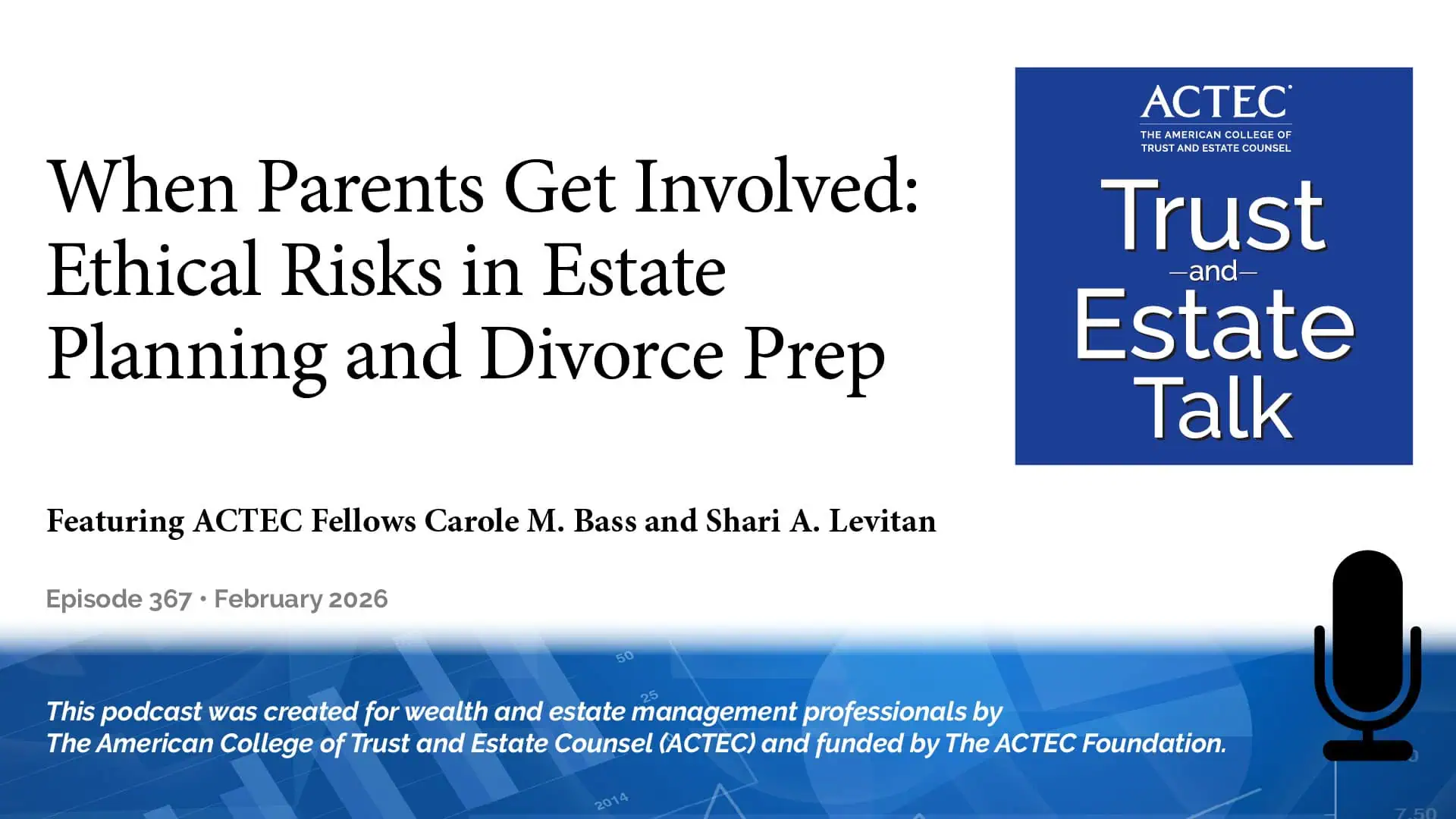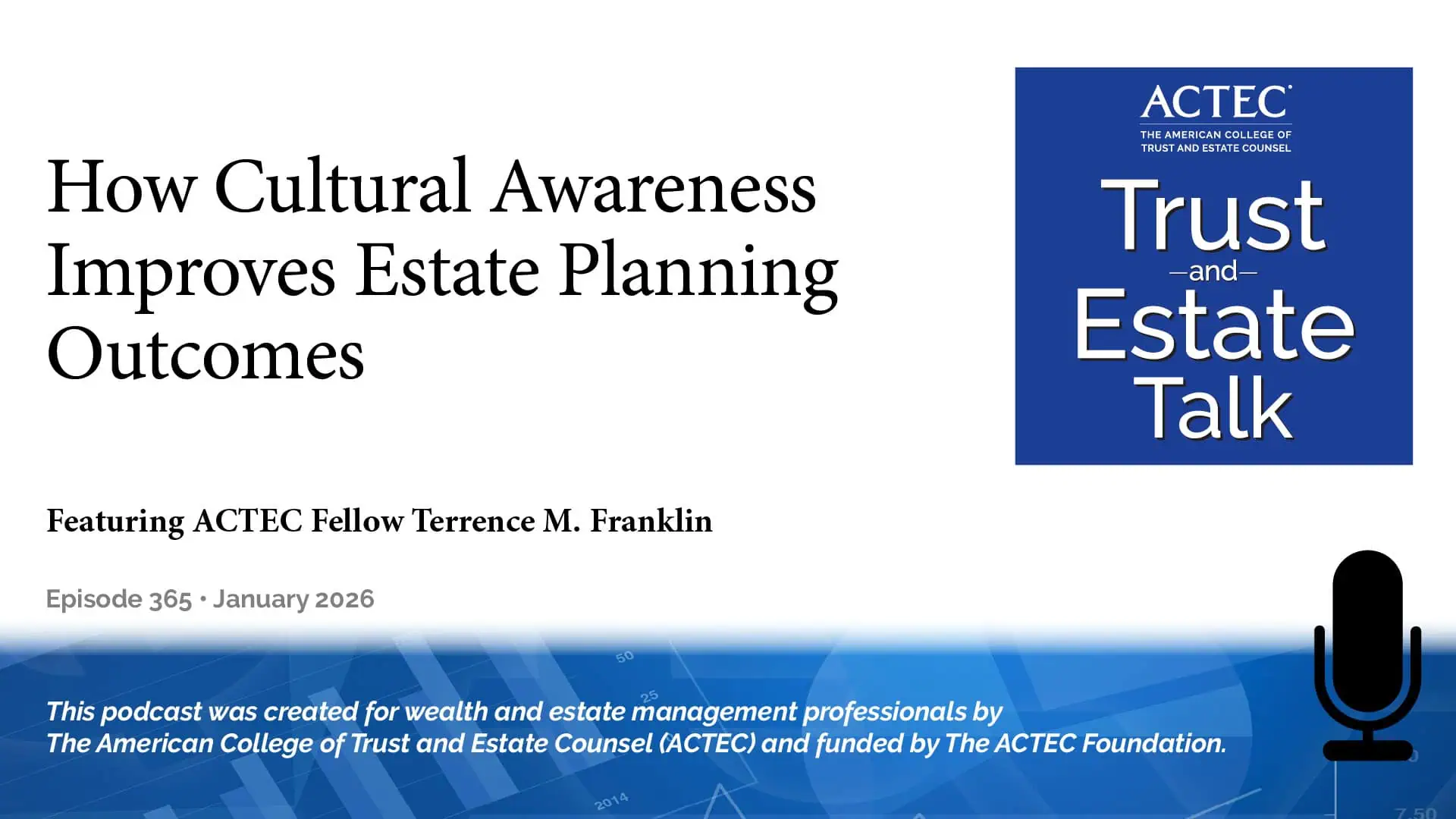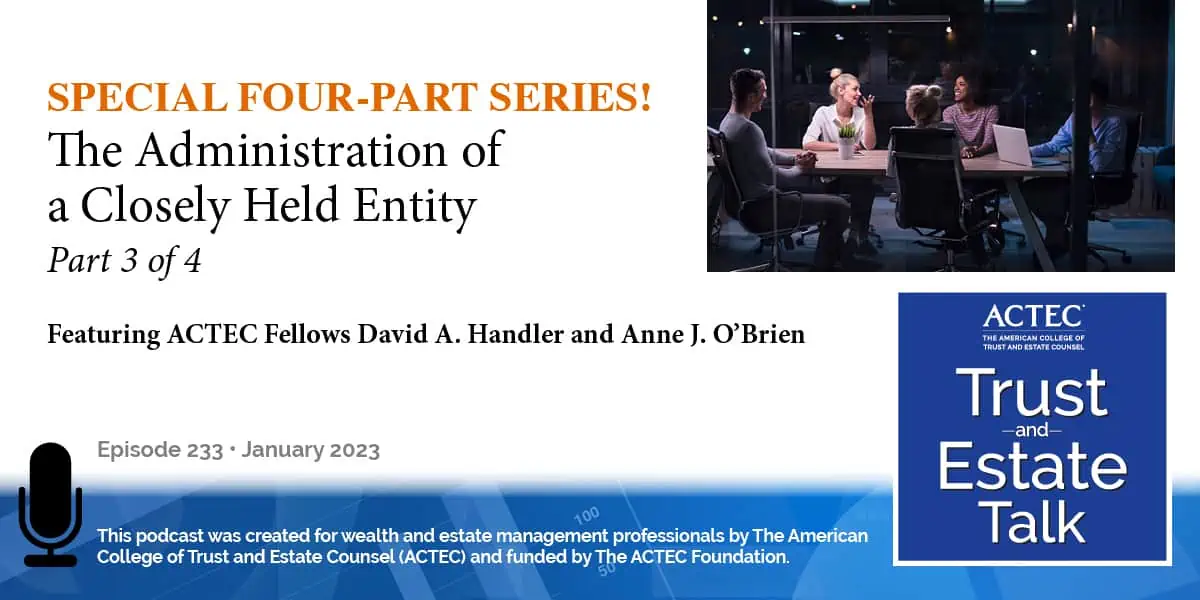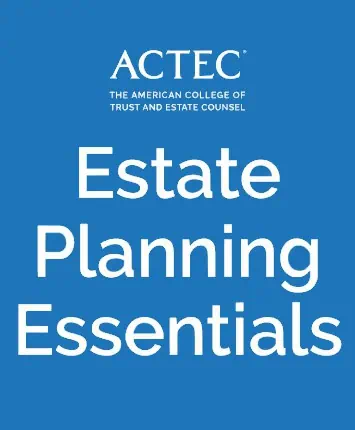The Administration of a Closely Held Entity (Pt. 3 of 4)
Part 2 of 4 of a deep dive into closely held entities:
- Series Overview (Pt. 1 of 4)
- Formation of a Closely Held Entity (Pt. 2 of 4)
- The Administration of a Closely Held Entity (Pt. 3 of 4) — (this podcast)
- Considerations in the Possible Liquidation of a Closely Held Entity and Other Alternatives (Pt. 4 of 4)
“The Administration of a Closely Held Entity,” that’s the subject of today’s ACTEC Trust and Estate Talk.
Transcript/Show Notes
This is Travis Hayes, ACTEC Fellow from Naples, Florida. Welcome to part three of ACTEC’s four-part series on closely held entities. Today we will discuss the administration of closely held entities and examine critical issues as well as discuss conducting a lifetime stress test for those entities. ACTEC Fellows David Handler of Chicago, Illinois, and Ann O’Brien of Washington, DC, will share their thoughts on this topic. Welcome, David and Ann.
Closely Held Entity Administration: Voting
David: Thank you. So, congratulations to anyone listening to this. You’ve established an LLC or family limited partnership. It’s been implemented. It’s possibly been transferred. Now we’re going to talk about how to make sure that basically, you don’t blow it from here or the client doesn’t. So, we’ll start with the two main cases – Strangi and Powell – that really informed us. Ann, do you want to tell us what those are telling us we shouldn’t do?
Ann: Well, those are basically, in just a few words, telling us don’t let the partner have a vote. Strangi, as we know, was 2001 and we weren’t sure whether they were really holding to that, but then Powell came along in 2017 and it was sort of Strangi redux. Both cases held that you had a 2036 problem because there was some sort of vote retained by the partner. So, the bottom line: just don’t have a vote. That’s really the main point of that, wouldn’t you say David?
David: Yeah, because 2036(a)(2) is what they brought up in both cases. They brought up 2036(a)(1) as well. They said look, you retained use of the property and all of the things that you shouldn’t do anyway. But on top of that, they said, we’ve got you on another one and that is you, alone in conjunction with any other person, have the right to designate who will possess the enjoyment. So, if you have a vote, even as a 1 percent LP, and that 1 percent LP is any kind of vote, for example, to dissolve the entity.
Which means you can affect the timing of when the partners receive distributions, that’s enough to cause estate inclusion. It doesn’t matter. The regulations go on to say, I think, in any capacity. So, whether you’re holding that power as a partner, a general partner or a manager, a trustee, or in your personal capacity, it doesn’t matter. That’s the part that we were a little surprised at.
Ann: Right. I think the only thing you can hold is the ability to manage investments. That does not cause a problem. But that’s about the only thing.
Closely Held Entity Administration: Exit Planning
David: That’s right. And so, given that, what should we do? Many of our clients, they’ve transferred partnership or LP interest to their trusts and they still own 10 percent or 20 percent. And that might be as a manager, as a general partner, as a limited partner, but if whatever they hold gives them any vote other than on things like investment management, it’s a problem.
So, our view is, to get rid of it. Give it away. Give away the rest. Sell the rest. Maybe the partnership or LLC has served its purposes. It’s time to dissolve it. I wouldn’t do it before the statute is run on the gift. Let it serve the purposes it was intended to, but maybe it’s been 10 or 20 years. Call it a day and dissolve it and distribute the assets, if it’s practical to do so.
Ann: One other case that we should point out that you need to think about is you have to have a bona fide business purpose for forming a partnership. It first was articulated in the Bongard case. There are many ways you can do that but you can’t just say it and then not walk the talk as well.
David: Walk the talk, yes.
Ann: So, be sure that you continue running the LLC or the partnership with that thought in mind. And moreover, make sure that the family understands what the business purpose was. If it comes up in an estate tax audit, as David points out, the decedent is not going to be able to testify. So, we have to make sure that someone understands that.
David: Right. And document it as you go – when it was formed, hopefully, it was documented: “these are the reasons we’re forming this.” And you can be honest, discounting can be one of them. I found in an audit that I had, an auditor from the IRS asked, “What was this formed for?” And I said, “Well, we’re forming it for joint investment to own this property to do this.” And he said, “And for discounting, right?” I said, “Yeah.” It is what it is.
But we had other bona fide real purposes that were observed and followed. But not everyone has that and so; or not everyone has the record to prove it. And so, that comes back to maybe you shouldn’t hold anything at all and it’s not on the estate tax return for 2036 to come up in the first place.
Closely Held Entity Administration: State Laws and Restrictions on Liquidation
Ann: So, going back to the comment about don’t hold the vote. If you give up a vote or there’s any lapse like that, you have to beware of 2704(a), which if the family controls and you give up a vote and it’s a lapse, then it’s considered either a gift during life or a bequest at death. So, be careful if you’re going to give up the vote that you’re not triggering 2704(a). The amount of those gifts tends to be small, but still, just don’t get yourself in that situation.
David: Right. So, in the time we have left, let’s talk about the other part of 2704 and that’s restrictions on liquidation. So, 2704(b), I believe it is, talks about restrictions on liquidation will be ignored if they’re applicable restrictions. So, generally, we look at 2704 and say, there’s an exception there if the restriction is no more restrictive than state law. It doesn’t say exactly in those terms, but that’s how it’s all been interpreted, then you’re fine.
So, for example, Delaware says an LLC can be dissolved by votes unless the agreement says otherwise. The default is 2/3 vote of the members. So, if your partnership agreement or LLC agreement says this can be dissolved by a 75 percent vote, that’s more restrictive than state law and that’ll be ignored. In fact, it won’t be cut back that 2/3 it’ll just be ignored, and then you decimate your discounts. So, one thing is to follow the state law. Default to the state law. Don’t make it more restrictive. Go ahead, Ann.
Ann: Well, what I was going to say is, I think a lot of us use Delaware law quite frequently. But if you’re going to use another state law, just make sure you look at what the statute says about dissolution. So, that you’re not stepping on that trap.
David: So, the other way to avoid applicable restrictions, so one it is, if it is, cannot be removed by the family. So, if there are restrictions on liquidation, for example, we can amend the agreement, we can tear it up, we can direct it to be dissolved – if it doesn’t say that other than by agreement of 2/3 for example, but if the family can remove the restriction or cannot remove the restriction no matter what it is, then it is not under 2704. So, you can have whatever rules you want on liquidation – whatever restrictions, whether it’s better, more or less restrictive than state law, as long as the family can’t amend the agreement. So, just like we often have a third-party trust protector who can amend a trust, you could have a third-party person who can amend the partnership or LLC agreement, but only they can do so. That’d be another solution regardless of what state you’re in.
Closely Held Entity Administration: Maintenance
Ann: Right. That’s so true. I think one of the best ways to keep a handle on what’s going on as the partnership is being administered, is trying to meet with the family or the partners once a year and get a handle on what activity has taken place. And just make sure there haven’t been any foot faults you may be able to cure, but you’re not going to be able to do that if you don’t know what’s going on. I think that’s a very important thing to do. Just follow the terms of the partnership agreement.
Comply with filing accurate returns and registration statements for each year. If there are loans, make sure that you comply with the loan terms. If there are distributions, they need to be pro-rata. Maintain current and accurate books and records. These all sound like routine simple things but as we know, they’re not always top of mind to a family partnership. What else can you say, David?
David: I’d say don’t overdo it.
Ann: Yes.
David: Don’t put all of your assets in. Don’t let your clients put too much of their assets in. They shouldn’t live out of these partnerships. Those are the poster child of the cases that get brought up. They’re living out of it. Their house is in it. It’s paying their bills. So, leave enough for them to survive on and live comfortably. And I recommend: I don’t like when people put their personal home in it. That just seems to run against any bona fide business purpose. Use it for investment.
Ann: Absolutely. Keep that home somewhere else. There are other things to do with it.
Travis: Thank you, David and Ann, for discussing issues related to the administration of closely held entities. Stay tuned for the final podcast in ACTEC’s four-part closely held entities series, which will address considerations and the possible liquidation of a closely held entity and other alternatives.
This podcast was produced by The American College of Trust and Estate Counsel, ACTEC. Listeners, including professionals, should under no circumstances rely upon this information as a substitute for their own research or for obtaining specific legal or tax advice from their own counsel. The material in this podcast is for information purposes only and is not intended to and should not be treated as legal advice or tax advice. The views expressed are those of speakers as of the date noted and not necessarily those of ACTEC or any speaker’s employer or firm. The information, opinions, and recommendations presented in this Podcast are for general information only and any reliance on the information provided in this Podcast is done at your own risk. The entire contents and design of this Podcast, are the property of ACTEC, or used by ACTEC with permission, and are protected under U.S. and international copyright and trademark laws. Except as otherwise provided herein, users of this Podcast may save and use information contained in the Podcast only for personal or other non-commercial, educational purposes. No other use, including, without limitation, reproduction, retransmission or editing, of this Podcast may be made without the prior written permission of The American College of Trust and Estate Counsel.
If you have ideas for a future ACTEC Trust & Estate Talk topic, please contact us at ACTECpodcast@ACTEC.org.
© 2018 – 2026 The American College of Trust and Estate Counsel. All rights reserved.
Latest ACTEC Trust and Estate Talk Podcasts

When Parents Get Involved: Ethical Risks in Estate Planning and Divorce Prep
When parents join prenup or divorce planning, ethical risks follow. ACTEC Fellows explore privilege, conflicts, and protecting the attorney-client relationship.

Useful But Overlooked Trusts: A Planner’s Guide to When and How to Use Them
Explore overlooked trusts—including HEETs, alimony, voting, and blind trusts—and when estate planners should use them to address complex client needs.

How Cultural Awareness Improves Estate Planning Outcomes
How cultural awareness improves estate planning outcomes, with insights on the racial wealth gap and strategies for more effective, inclusive client guidance.



